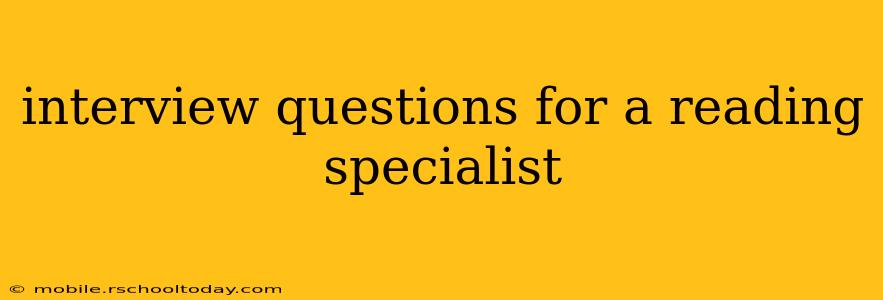Finding the right reading specialist is crucial for fostering a love of reading and ensuring students achieve their full literacy potential. This guide provides a comprehensive list of interview questions designed to help you identify a highly skilled and passionate educator. We've categorized the questions for clarity and to help you cover all essential aspects of the role.
I. Experience and Qualifications
These questions assess the candidate's background, expertise, and understanding of best practices in reading instruction.
- Tell me about your experience working with students who have diverse learning needs in reading. This open-ended question allows the candidate to showcase their experience and highlight their adaptability. Look for specific examples and strategies they've employed successfully.
- Describe your experience using different reading assessments and how you interpret the results to inform your instruction. This question gauges their familiarity with various assessment tools and their ability to translate assessment data into effective teaching strategies.
- What professional development activities have you undertaken recently to enhance your reading instruction skills? Continuous learning is vital in this field. Assess their commitment to staying current with research and best practices.
- What specific reading interventions or programs are you familiar with, and which ones have you found most effective? This helps determine their knowledge base of evidence-based interventions like Orton-Gillingham, Wilson Reading System, or others. Focus on why they found specific programs effective.
- Can you describe your approach to differentiating instruction to meet the needs of students at varying reading levels within a single classroom or group? Effective reading specialists are adept at tailoring instruction to individual student needs.
II. Instructional Strategies and Approaches
These questions delve into the candidate's teaching philosophy and methodologies.
- How do you foster a positive and supportive learning environment for students who struggle with reading? Building confidence and motivation is crucial. Look for answers that emphasize encouragement, patience, and celebrating small successes.
- Explain your approach to teaching phonics, phonemic awareness, fluency, vocabulary, and comprehension. This assesses their understanding of the key components of reading instruction. Do they utilize a balanced literacy approach?
- How do you incorporate technology and other resources into your reading instruction? This explores their ability to leverage technology effectively to enhance learning.
- How do you collaborate with classroom teachers, parents, and other specialists to support students' reading development? Effective communication and collaboration are key to successful intervention.
- Describe a time you had to adapt your teaching strategies to meet the unique needs of a struggling reader. What was the challenge, and how did you overcome it? This provides valuable insight into their problem-solving abilities and adaptability.
III. Assessment and Data Analysis
These questions assess the candidate's ability to track progress, analyze data, and use it to inform instruction.
- How do you monitor student progress and use data to adjust your instruction? This highlights their data-driven approach to teaching. Look for specific examples of how they track progress and adapt their instruction based on data.
- What are some key indicators you look for to determine if a student is making progress in reading? This question helps assess their understanding of reading development milestones and progress indicators.
- How do you communicate student progress and intervention needs to parents and classroom teachers? Effective communication is crucial for keeping everyone informed and working collaboratively.
IV. Professionalism and Ethics
These questions assess the candidate's professional demeanor, ethical considerations, and commitment to the profession.
- How do you maintain confidentiality when working with students and their families? This is a crucial aspect of ethical practice.
- Describe your approach to building rapport and trust with students and their families. Building strong relationships is essential for successful interventions.
- How do you handle challenging situations or conflicts with students or parents? This evaluates their conflict resolution skills and professionalism.
By using these questions as a guide, you can conduct a thorough and effective interview to identify the best reading specialist for your students. Remember to allow ample time for the candidate to respond and to follow up with clarifying questions to gain a deeper understanding of their expertise and approach.
